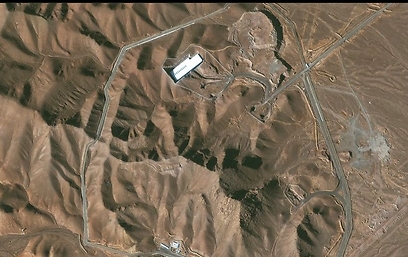
The legislation is sponsored by Republican Sen. Lindsey Graham and Democratic Sen. Robert Menendez. The two hope to see the resolution accepted before Obama's spring visit to Israel.
Related stories:
- Iran nuclear talks constructive, diplomat says
- World powers coax Iran into saving nuclear talks
- PM urges powers to issue Iran military threat
“No one wants another conflict anywhere in the world militarily, but we also don’t want a nuclear-capable Iran,” Graham, a South Carolina Republican and a member of the Senate's Committee on Armed Services, said at a press conference.
His partner, Sen. Robert Menendez, a Democrat and the chairman of the Senate Foreign Relations Committee reiterated the US's desire for achieving progress with Iran through negotiation and not military action, but poignantly noted that “we will not talk for talking sake.”
“This is not a green light to Israel to do anything other than defend itself (and a promise that) we will be there,” Graham said.
At the heart of the bipartisan resolution stands the promise to support Israel in the case of an attack.
According to the resolution, if Israel is “compelled to take military action in self-defense, the United States government should stand with Israel and provide diplomatic, military and economic support to the government of Israel in its defense of its territory, people and existence.”
Befitting a bipartisan initiative, the legislation is backed by senators from both sides of the bench.
Joining the two are Democrats Sen. Chuck Schumer from New York, Sen. Bob Casey from Pennsylvania and Sen. Richard Blumenthal from Connecticut as well as Republicans Sen. Susan Collins from Maine and Sen. John Hoeven from North Dakota.
The Senators involved in the legislation hope to see it pass before President Barak Obama's March 20th visit.

Fodor (Screenshot: Daily Telegraph)
At this stage, the official American position regarding Teheran is to continue with negotiation attempts. However, behind closed doors, US officials are reported to have shown Israel contingency plans for military action, in case the Islamic Republic attempts a breakthrough in its nuclear program.
This week saw the end of the first round of renewed bilateral talks between Iran and the world powers in Kazakhstan.
According to reports, the six powers participating in the talks presented Teheran with a new offer, which included a relaxing of some the economic sanctions burdening the country in return for the Islamic Republic's promise to put their nuclear program on ice.
Russia's deputy foreign minister confirmed that the powers did indeed offer Iran a deal for loosening sanctions in return for dropping uranium enrichment levels at Fordo to 20%.
- Receive Ynetnews updates
directly to your desktop















